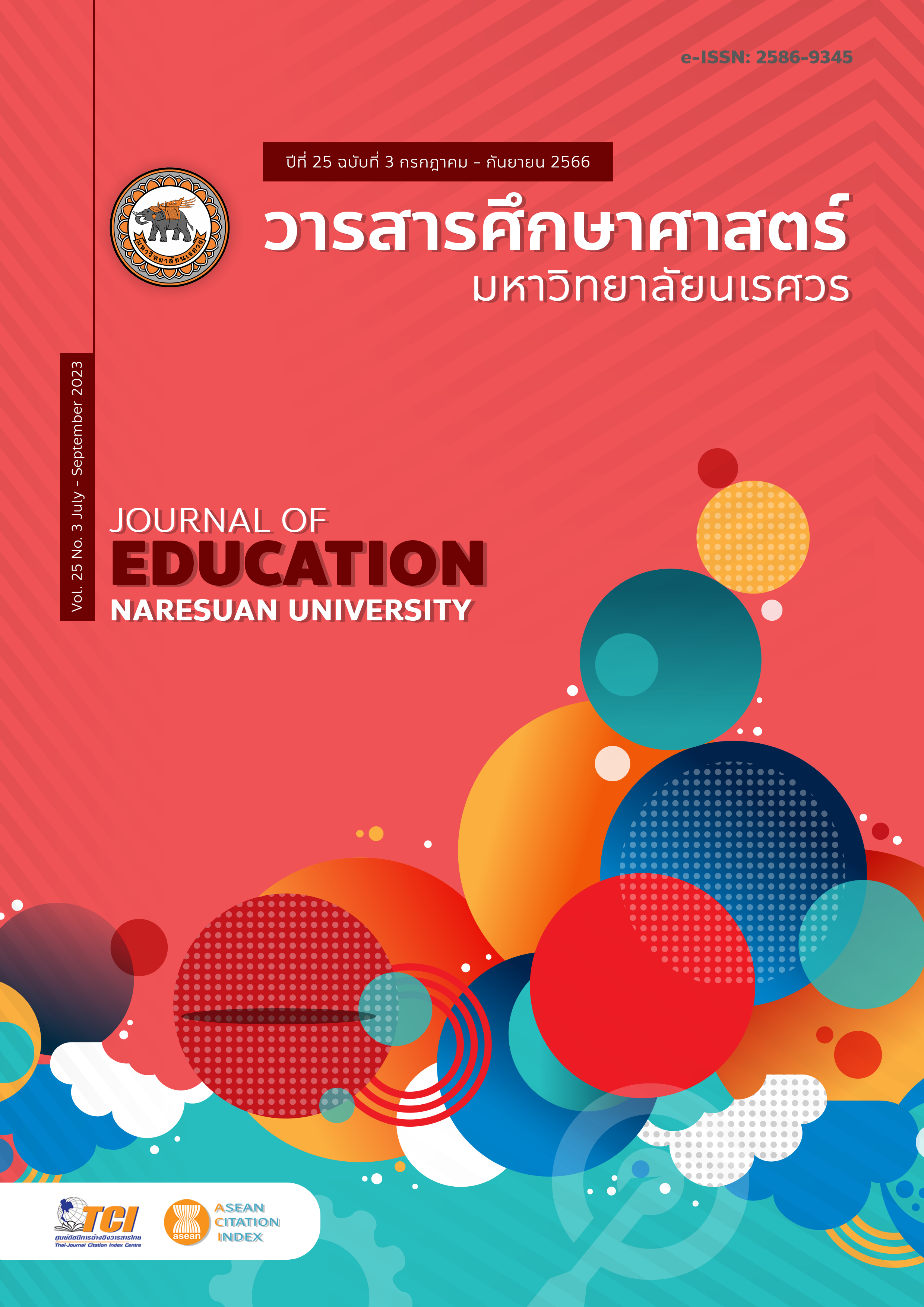TEACHERS’ NETWORK OF MICRO-LEARNING DEVELOPMENT FOR ELEMENTARY SCHOOL STUDENTS IN PHITSANULOK เครือข่ายครูพัฒนาไมโครเลิร์นนิ่งสำหรับนักเรียนชั้นประถมศึกษาจังหวัดพิษณุโลก
Main Article Content
Abstract
Micro-learning is a compact-sized media to deliver relevant content, no longer than 3-5 minutes. The objectives of this research were 1) to study the teachers’ network of micro-Learning development for elementary school students in Phitsanulok and 2) to create and examine and study the results of using the teachers’ network of micro-Learning development for elementary school students in Phitsanulok. The research was divided into 3 phases: the first phase was to examine the needs and requirements for micro-learning development. The sample were 450 teachers in primary school level at Phitsanulok. The research instrument was a rating scale. The data were analyzed by averages, standard deviation, and PNImodified Index. The second phase was to build and validate a network of micro-learning development teachers. The sample was 5 experts. The research instrument was a teacher network quality evaluation form. The data were analyzed by inductive method, mean, and standard deviation. The third phase was to study the results of using the teacher network. The sample was 30 teachers in primary school level at Phitsanulok Province. The research instrument was an authentic test of micro-learning development skills. The data were analyzed by averages, standard deviation, and t test. The research results revealed that:
1. The teachers had a need for micro-learning development. In descending order: 1) content management skills, 2) platform management skills, and 3) media management skills, the PNImodified indexes were 0.743, 0.694 and 0.674, respectively.
2. the teachers’ network of micro-Learning development for elementary school students in Phitsanulok consisted of 6 components: 1) concept, 2) goals, 3) members, 4) network development process, (5) support follow-up, and (6) evaluation. The quality of the micro-learning teacher development network had the correct principles, appropriate contexts, useful benefits, and possible application at a very high level.
3. The teacher's micro-learning development skills after development were 23.27, which was significantly higher than the 80 percent threshold at the .001 level, and the effect size of 1.60 was very high.
Article Details

This work is licensed under a Creative Commons Attribution-NonCommercial-NoDerivatives 4.0 International License.
The owner of the article does not copy or violate any of its copyright. If any copyright infringement occurs or prosecution, in any case, the Editorial Board is not involved in all the rights to the owner of the article to be performed.
References
Anand, & Timothy. (2016). Technology enabled learning excellence essentials. Aurora.
Asha Pandey. (2016). Benefits of microlearning-based training. Retrieved May 3, 2020, from, https://elearningindustry.com/10-benefits-microlearning-based-training.
Bruck, P. A., Motiwalla, L., & Foerster, F. (2012). Mobile learning with micro-content: a framework and evaluation. 25th Bled eConference. Retrieved from www.bledconference.org
Bridge Learning Solution. Micro-learning. (2016). Retrieved from https://www.bridgeslearningsolutions.com
Hug, T. (2005). Micro learning and narration: exploring possibilities of utilization of narrations and storytelling for the design of “micro units” and didactical micro-learning arrangements. In Proceedings of Media in Transition. MIT, Cambridge, MA.
Job, M. A., & Ogalo, H. S. (2012). Micro learning as innovative process of knowledge strategy. International Journal of Scientific & Technology Research, 1(11), 92-96.
Lindner, M., & Bruck, P. A. (2004). Micromedia and corporate learning (p. 8). In Proceedings of the 3rd International Micro Learning 2007 Conference. Innsbruck: Innsbruck University Press.
Meng, J., & Li, Z. (2016). Feasibility of applying mobile micro-learning to college English learning. Advances in Social Science, Education and Humanities Research (ASSEHR). Volume 75 International Seminar on Education, Innovation and Economic Management (SEIEM 2016), 481-484.
Mohammed, G. S., Wakil, K., & Nawroly, S. S. (2018). The effectiveness of microlearning to improve students’ learning ability. International Journal of Educational Research Review, 3(3), 32-38.
Moomark, M., Onthanee, A., Kaewurai, W., Rinjalean, A. (2016). A curriculum development to enhance classroom action research competency with knowledge management network for teachers. Journal of Education Naresuan University, 18(1), 1-9. [in Thai]
Nikou, S. A. (2018). Mobile-based micro-learning and assessment: Impact on learning performance and motivation of high school students. Journal of Computer Assisted Learning, 34(3), 269-268.
Nilkaewbowonvit, P., Chaichompoo, S., & Wongnam, P. (2016). Model of academic cooperation network Development of Primary Educational Service Area Offices under the Office of Basic Education Commission. Journal of Education, 27(3), 18-32. [in Thai]
Niramol, K., Topithak, K., Chumruksa, C., Kasinant, C., Suwanmanee, S., kaewmanee, C., & Sae-tae, K. (2020). Process-Driven Education Technology in schools under the Office of Private Education in Southern Border. Bangkok: National Research Council. [in Thai]
Nirathorn, N. (2000). Working networking: Some considerations. Bangkok: Thammasat University. [in Thai]
Peng, D. (2017). On platform construction of English vocabulary learning in higher vocational colleges based on mobile micro learning advances in economics, business and management research. The 9th International Economics, Management and Education Technology Conference (IEMETC 2017). Volume 48, 512-520.
Sudarshana, S. (2016). 8 tips for creating effective microlearning courses. Retrieved May 20, 2020, from https://www.trainingindustry.com/articles/content-development
Thepkraiwun, P. (2011). The development of a collaborative network model for educational quality management in small sized primary schools (Doctoral dissertation). Khon Kaen: Khon Kaen University. [in Thai]
Valaisathien, P. (2005). Learning innovation: People, communities and development. Bangkok: Phisit Thai Offset. [in Thai]
Wechayachai, A. (2001). Research report on parents' participation in educational development. Bangkok: Office of the National Education Commission. [in Thai]


